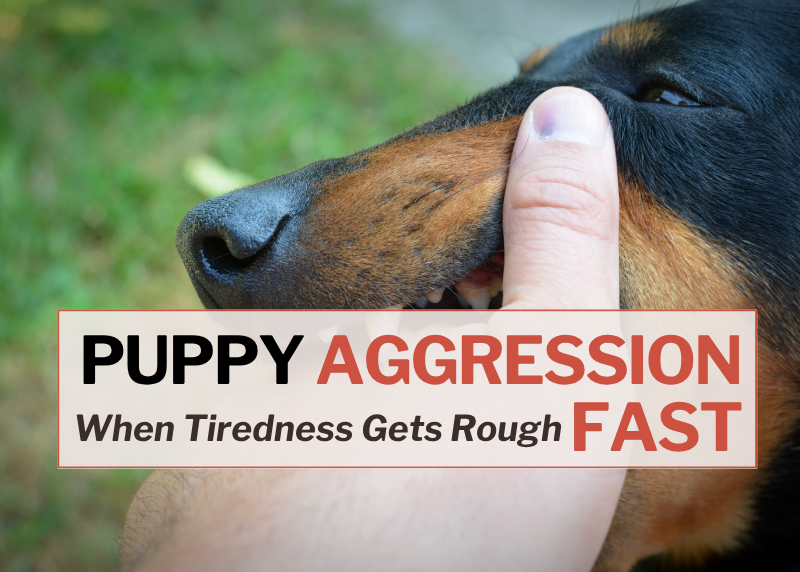You know that moment when your puppy suddenly turns from snuggle bug to sock assassin around 7PM? Yep, we are here to talk about puppy aggression when tired.
This phenomenon is surprisingly common, wildly misunderstood, and—thankfully—something you can manage with the right approach. Whether you’re a first-time dog parent or just deep in the puppy trenches again, this comprehensive guide will walk you through what’s happening, why it’s happening, and how to survive it with your patience (and ankles) intact.
The Tiny Terror That Appears at 7PM
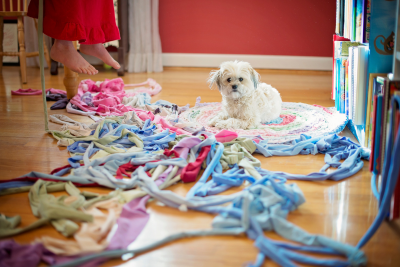
You imagined sleepy snuggles. Instead? Ankle attacks. If your tired puppy turns into a fur missile before bed, you’re not alone.
This phase is common, frustrating, and (thankfully) fixable.
What’s Actually Going On Here?
Evening hours are when many pet parents notice a spike in hyperactivity or nipping. It’s not you—it’s science. Puppies get overstimulated, overtired, and start spiraling. Understanding this pattern is the first step to calming the chaos.
In this post, we’ll cover:
- Why puppies get aggressive when tired
- Early warning signs to watch for
- The best way to prevent meltdown mode
- When it’s time to call in professional help
Let’s dive into the bedtime beast mode.
What Is Puppy Aggression and Is It Really “Aggression”?
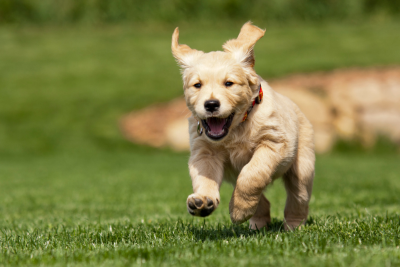
Spoiler alert: most of the time, it’s not.
When your pup is tired and acting out, what you’re seeing isn’t true aggression—it’s a lack of self-regulation.
Just like a sleepy toddler might yell and throw their favorite toy across the room, your puppy might resort to biting, barking, or general chaos.
This behavior is typically a short-lived stage in puppyhood. It falls under what’s often called the “puppy witching hour” — a period when your dog loses the ability to manage their excitement, frustration, and exhaustion all at once.
True signs of aggression in adult dogs often include:
- Stiff body language
- Sustained growling
- Snarling
- Snapping with intent to harm
In contrast, a tired puppy usually acts silly, hyper, or unpredictable—but not genuinely dangerous. Understanding the difference helps you respond with patience instead of panic. Remember, this is a phase, not a personality flaw. That said, if your dog starts showing aggressive behavior even when well-rested, or if you’re unsure whether it’s a tired tantrum or something more serious, it’s worth reaching out for professional help.
? Curious if crate naps are a good idea? Find out in our post on daytime puppy naps.
Why Do Puppies Get Aggressive When Tired?
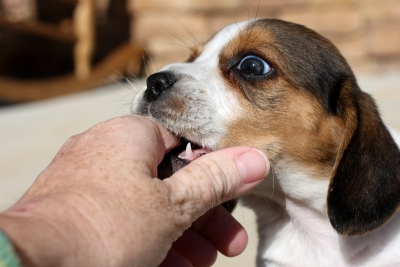
Let’s decode the gremlin transformation.
When your puppy is overstimulated, exhausted, and still fighting sleep (because FOMO is real), their developing brain can short-circuit.
Here are some common reasons behind that bitey bedtime behavior:
1. Developmental Stage
Young puppies are still learning how to regulate their impulses.
Puppies need time, structure, and guidance to learn which behaviors are appropriate—especially when supported with positive reinforcement training, which rewards calm choices and builds trust.
2. Brain Overload
Your puppy’s brain is constantly processing new sounds, smells, textures, and rules.
By evening, their mental tank is empty. Cue impulsive reactions, like nipping your sleeve or barking at dust particles.
3. Emotional Frustration
Maybe they didn’t get enough playtime or had a stressful outing.
That pent-up energy can turn into hyper zoomies and reactive behavior. It’s one of the most common reasons dogs act out before bedtime.
4. You (Accidentally) Made It Worse
Yes, we love them to pieces.
But when a new puppy gets attention for rough behavior—even negative attention—it can unintentionally reinforce the outbursts.
Puppies are like little sponges soaking up patterns.
Compare this to a hangry toddler at the end of a long day. They’re not evil, just exhausted and cranky. And honestly, same.
Signs of an Overtired Puppy (a.k.a. Tantrum Time)
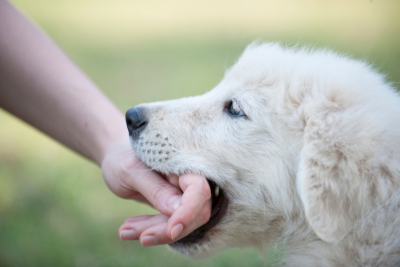
Spotting an oncoming meltdown is your superpower. Whether you’re dealing with a reactive dog or just a new puppy having a rough evening, the warning signs are there if you know what to look for.
? Want to learn more about dog sleep? check out Why Does My Dog Sleep So Much
Here are Telltale Signs your Dog is Flirting With a Bedtime Tantrum:
- Sudden zoomies that end in wild jumping or biting
- Growling or barking at inanimate objects (or your face)
- Grabbing onto your clothes or fingers
- Ignoring your voice like you’re a ghost
- Unfocused eyes or excessive licking
- Whining while refusing to settle
These behaviors aren’t just random—they’re signs of aggression tied to being overtired or overstimulated.
If your tired dog starts acting out regularly, it could be a sign that they need a more structured routine—or more daytime training sessions to release energy constructively.
Recognizing this pattern early is the best way to prevent full-blown chaos.
If your new puppy suddenly treats your sweatpants like a tug toy or starts shadow boxing your furniture, congrats—you’re in the splash zone of a classic overtired outburst.
Don’t worry—we’ll show you the best way to manage it.
How to Prevent the Overtired-Puppy Meltdown
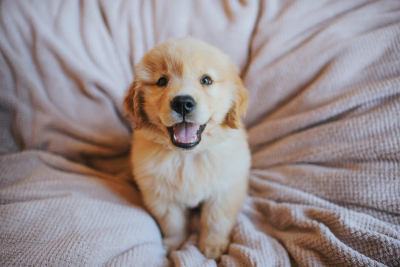
The best way to avoid puppy aggression when tired? Stop the tiredness before it spirals by setting up smart routines and adjusting your puppy’s daily flow.
✅ Want more tips for setting up your home for calm evenings? Don’t miss our guide on crate training while at work.
Why Prevention Works
When you prevent overtiredness in the first place, you’re not just avoiding nips and chaos—you’re actively shaping a calmer, more regulated pup.. Puppies who get the rest and structure they need are more likely to respond well to training and less likely to develop lasting behavior issues. That solid foundation sets them up to feel like a confident, well-adjusted top dog in any situation.
Here’s how to stay ahead of the cranky:
1. Create a Nap Schedule
Your puppy needs 16–20 hours of sleep per day.
Yes, that much. Miss too many naps and you’ve got a furry time bomb.
2. Watch for Sleepy Signals
Yawning, zoning out, floppy body language—classic signs it’s naptime.
Redirect them before the meltdown begins.
3. Use Calm-Down Tools
Frozen Kongs, slow-feed bowls, chew toys, or even a cozy blanket corner. These tools help create positive experiences around rest and make winding down easier for your pup.
4. Crate and Playpen Time
Safe spaces aren’t punishment. They’re how dogs reset.
Use crates or pens to encourage calm rest without distraction.
5. Break Up Their Day
Training sessions, potty breaks, enrichment toys—build structure around fun.
When puppies know what to expect, they’re less likely to act out.
These are the best ways to prevent aggressive behavior later in the evening. A tired dog with structure is a happy one (and so are your ankles).
What to Do In the Moment When Aggression Hits
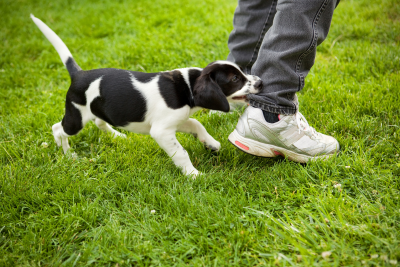
Even with structure, meltdowns happen—especially in the evenings when your puppy is most likely to be overstimulated and running on empty. These sudden outbursts don’t mean you’ve failed as a pet parent. They’re actually a chance to reinforce calm behavior and build resilience.
When they do happen, here’s how to handle them like a pro:
1. Stay Calm
Yelling or reacting with frustration only fuels the chaos.
Breathe, then act.
2. Redirect the Energy
Toss a chew toy, give a frozen carrot, or use a puzzle feeder. Redirection is your best friend.
It gives your tired dog something appropriate to sink their teeth into.
3. Guide to a Safe Space
Use a crate, playpen, or even a dog bed in a quiet spot.
Removing stimulation can prevent escalation and help them reset.
4. Don’t Add Fuel
Skip roughhousing. Don’t introduce new commands.
This isn’t a teaching moment—it’s a recovery mission.
5. Ignore What You Can
Mild growls or minor mouthiness? Sometimes the best thing is to calmly ignore.
You’re not rewarding the behavior, just not feeding it attention.
These responses aren’t just quick fixes—they build trust and resilience over time. And if the aggression persists, it’s totally okay to get professional help.
What Not to Do
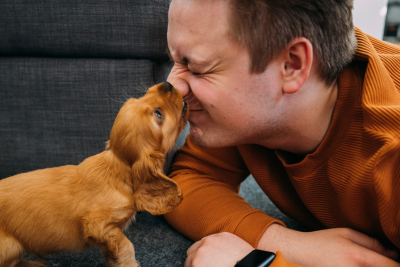
Sometimes it’s not just what you do—but what you avoid doing—that makes the biggest difference, especially when dealing with an overtired puppy who seems to go from zero to zoomies in seconds.
Many common reactions from pet parents—like raising their voice or roughhousing—can actually reinforce unwanted behavior or send mixed signals.
Here’s what not to do when dealing with a tired, mouthy pup:
1. Don’t Yell or Punish
Raising your voice can make your puppy more anxious—or more amped up.
It can escalate reactive behavior instead of calming it, and loud corrections often create confusion rather than clarity. This is especially true for puppies who are still figuring out how to navigate human expectations and environments.
2. Don’t Assume It’s Dominance
Puppies aren’t trying to take over your household. They’re usually overwhelmed, not power-hungry. Their erratic behavior is more about being emotionally flooded than plotting a mutiny. When you’re able to meet their needs for rest and structure, those wild moments start to fade.
3. Don’t Ignore It Completely
Yes, some things can be ignored. But repeated, intense biting or growling? That deserves a strategy. Ignoring it completely can actually make your puppy more overwhelmed. Instead, help them settle by limiting their options—like using a leash, crate, or playpen—and reward calm behavior when it returns.
4. Don’t Roughhouse
Especially in the evenings, avoid high-energy play that blurs boundaries.
A tired dog doesn’t need a wrestling match—they need recovery.
Trying to reason with an overtired puppy is like negotiating with a toddler in a sugar crash.
It won’t go well.
Better to lead with calm, consistency, and a safe plan.
? Puppy feeling extra jumpy after playtime? You might also like our post on whether dog parks are a good fit for puppies.
Real Talk: When Is It Actually a Problem?
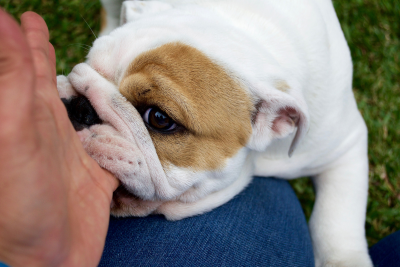
Most puppy aggression when tired is harmless and passes with rest and routine.
But sometimes it signals something more.
4 Signs It’s Time to Seek out Professional Help
Occasional puppy nips at bedtime? Totally normal. But if you’re seeing intense, unpredictable, or escalating behavior, it’s worth considering what else might be going on.
Consider seeking professional help if:
1. Aggression Shows Up at Other Times
Your dog shows aggressive behavior around their things, like their toys during play, while feeding, or random interactions. This may point to a deeper behavioral concern.
2. Biting Is Intense or Hard to Redirect
If your puppy’s biting is frequent, forceful, or doesn’t stop even with redirection, it’s time to dig deeper. Persistent biting might indicate stress, lack of impulse control, or pain.
3. Growling or Snapping During Calm Moments
They growl or snap when calmly approached, especially if this happens when they’re not overly tired or overstimulated. This could suggest anxiety, discomfort, or guarding tendencies.
4. Nothing Seems to Help
You’ve tried consistent training, structure, rest, and enrichment—but nothing improves. That’s a clear sign it’s time to bring in a professional trainer or veterinary behaviorist.
These signs might point to anxiety, pain, reactivity, or another behavioral concern—not just an overtired pup.
There’s no shame in asking for support—especially if you are doing this for the first time. Trainers and behaviorists can help you figure out what’s going on and come up with a plan.
Because sometimes the best way to care for your dog… is with backup.
Sample Daily Schedule to Prevent Overtired Puppy Behavior
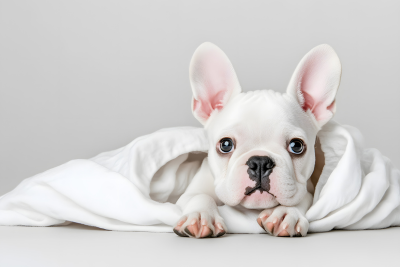
Preventing aggression often comes down to structure. Puppies thrive on rhythm, and without it, they can become overstimulated, overtired, and yes—extra bitey. A thoughtful daily schedule helps balance your puppy’s needs for rest, mental stimulation, and appropriate outlets for energy.
Why Routine Matters
Routine creates predictability, which helps puppies feel safe and regulated. A well-planned day gives your dog enough downtime to avoid overstimulation and enough engagement to prevent boredom. It’s not about being strict—it’s about helping your puppy succeed.
Here’s a sample daily routine that balances rest, activity, and enrichment:
7:00 AM – Morning potty break + short walk
8:00 AM – Breakfast + chew toy time (slow-feed bowl optional)
9:00 AM – Nap (crate or quiet space)
11:00 AM – Light training session + potty break
12:00 PM – Lunch or treat puzzle + calm cuddle time
1:00 PM – Nap (again!)
3:00 PM – Enrichment activity: snuffle mat, play tunnel, or brief outing
5:00 PM – Dinner + low-energy play
6:30 PM – Wind-down time with a stuffed Kong or gentle brushing
7:30 PM – Final potty + settle in for the night
? Struggling with potty training too? Check out our post on potty training small dogs—especially helpful for chaotic evenings!
The goal? Prevent overtired chaos by offering consistency, predictability, and built-in down time.
Even reactive dogs and high-energy puppies thrive with structure.
Bonus: You’ll get to eat dinner without your shoelaces being chewed off.
Bonus FAQ: Common Questions from Dog Owners
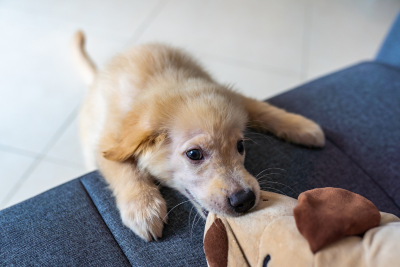
1. Why does my puppy act aggressive only at night?
Overtired puppies often exhibit evening zoomies and biting. This is typically due to lack of sleep, overstimulation, or not enough sleep — not true aggression.
2. Is puppy aggression when tired normal for a well-behaved dog?
Yes. Even the most well-behaved puppies can act out when they’re tired. It’s part of learning boundaries and developing self-regulation. It does not mean they aren’t a good dog.
3. How do I calm my tired puppy around young children?
Use crate training, physical boundaries, and supervised play. Tired puppies may nip or jump, so create safe spaces and model calm interactions.
4. When should I seek help for my puppy’s aggressive behavior?
If the behavior persists despite training, sleep, and structure—or if it’s occurring outside tired periods—consult a professional dog trainer or veterinary behaviorist to rule out any health issues.
5. What is the best first step to address tired puppy aggression?
Start with a solid sleep schedule and clear routines. These foundational changes are often the root cause of an overtired puppy.
6. What tools can help manage puppy aggression when tired?
Chew toys, frozen Kongs, playpens, and calming routines are great tools. Focus on proper training as enrichment and connection. Remember this is not a behavior problem that defines their personality.
7. Can I still raise a well-behaved dog after dealing with tired puppy aggression?
Absolutely. These behaviors are normal, especially for first-time pet parents. With consistency, your pup will mature into a calm, confident dog.
8. What are signs my puppy is overtired and about to act out?
Look for zoomies, growling, grabbing clothes, ignoring cues, and wild-eyed behavior. These are classic signs of an overtired puppy.
9. How can I use positive reinforcement training with an overtired puppy?
Reward calm moments immediately—like when they lie down or stop biting. Use high-value treats and keep sessions short and predictable. YouTube can be a valuable resource to learn more about positive reinforcement.
10. Is it okay to ignore overtired aggression in puppies?
Only to a point. Ignoring mild behavior is fine, but repeated aggression needs a reset. Use a crate or leash to limit stimulation and reinforce calm behavior.
Let’s recap:
- Puppy aggression when tired is super common.
- It’s usually not true aggression—it’s exhaustion.
- A predictable schedule, calming tools, and early bedtime cues are your best defense.
- Don’t panic if things get wild. Just redirect, reset, and rest.
- If you need extra help, reach out to a trainer or vet.
This phase doesn’t last forever. Your puppy will grow, settle, and eventually, bedtime will become your favorite time of day.
In the meantime, keep your fingers safe, your routine solid, and your sense of humor fully charged.
Hang in There, Gremlin Wrangler
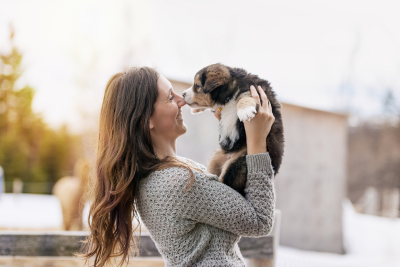
Raising a puppy isn’t always cozy cuddles and tail wags—sometimes, it’s sharp teeth at bedtime and wondering what went wrong.
But the good news? Puppy aggression when tired is a normal, solvable stage. With structure, rest, and a little strategy, your evening gremlin will transform back into a sleepy sidekick before you know it.
Stick with it. You’re learning, your pup’s learning, and every calm bedtime is a win for both of you.
Now go grab a chew toy (or maybe a cookie—for yourself). You’ve got this.

